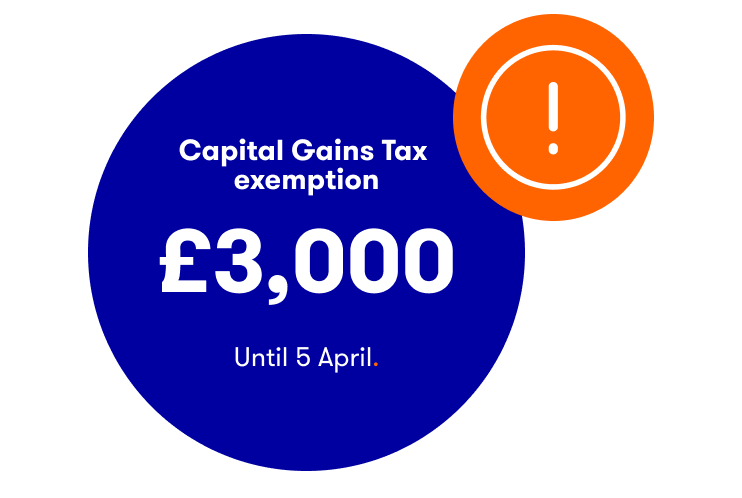Capital Gains Tax rates and allowance
Find out everything you need to know about the capital gains tax rates and allowances, and how the changes for the current tax year (2025/26) will affect your upcoming report.

Capital gains tax (CGT) applies when you make a gain from the sale, gift or disposal of an asset, where the asset has risen in value since you’ve owned it. You aren’t taxed on the total amount you sold the asset for, only the profit you make.
Knowing how capital gains tax works can be challenging because there are so many moving parts to consider, especially because of recent announcements regarding the changes in CGT allowance.
Whether it’s your first time paying Capital Gains Tax, or you aren’t clear on the new allowance, understanding the current rates and allowances will allow you to apply these to your specific circumstances.
This guide aims to clarify the key points of CGT allowances and rates for the tax year 2025/26, and provide next steps to calculate your next report.
Capital gains tax rate in 2025/26
It’s important to clarify that the capital gains tax rate isn’t the same as income tax rates. Your taxable income does play a part in determining your CGT rate, but the brackets are different, and you will need to do some calculations to check the percentage you need to pay on all of your gains.
Your CGT rate depends on your taxable income. There are two rates in place, one for basic rate taxpayers and another for higher rate taxpayers.
Tax band | Taxable income | CGT % rate |
Basic rate | £12,571 to £50,270 | 18% |
Higher or additional rate | £50,271 and over | 24% |
As there are only two brackets, it’s relatively straightforward to work out your rates if your taxable income is above £50,271.
Higher or additional rate taxpayers
If your taxable income is above £50,271 and you pay a tax rate of 40%, you’re in this bracket.
For a basic rate taxpayer on the other hand, it’s possible that your gains might push your total taxable income into the upper bracket.
Basic rate taxpayer
If your taxable income is between £12,571 and £50,270 and you pay an income tax rate of 20%, you’re in this bracket. To determine your capital gains rates as a basic rate taxpayer, you’ll need to follow a few steps:
Establish your taxable income. Remember to consider your tax-free Personal Allowance (earnings up to £12,570) and any other tax relief you’re entitled to.
Work out total gains for each asset you’ve sold, taking any losses into account if applicable.
Deduct the tax-free allowance (currently £3,000) from the total gains to find your taxable gains.
Add your taxable income and taxable gains to find your total taxable amount for the tax year.
If this final amount falls within the basic income tax band, you’ll pay 18%. If part of this amount is over the basic rate, only the amount exceeding this will be taxed in the higher bracket, at 24%.
Disclaimer: calculation guidance is for informational purposes only and should not be construed as tax advice. Please seek independent financial advice on your specific circumstances before submitting your capital gain tax report to HMRC.
Capital gains tax allowance
The good news is, individuals are entitled to a capital gains tax allowance each tax year, which allows you to keep a set amount to yourself without having to pay any tax on it.
For the current tax year (2025/26), the CGT allowance is £3,000. So no matter how much your gains are, up to £3,000 of it is tax-exempt and yours to enjoy as pure profit. CGT is only applicable to gains exceeding £3,000, and you’ll be liable to pay tax on gains when it exceeds this amount.
Changes to capital gains tax allowance for 2025/26
The capital gains tax allowance has been gradually reduced over the last few years. In tax year 2025/26, the CGT allowance is £3,000.
If you often invest in shares, or want to start, this may be a good time to consider setting up an ISA or SIPP to prevent your CGT from increasing. Investments held within these accounts are ‘tax wrapped’, and are protected from both income and capital gains tax.

Example Scenario
What assets do I need to pay CGT on?
CGT may apply when you sell, gift, or get rid of an asset. Regardless of how an asset leaves your possession, you’ll see this referred to as ‘disposing’ of an asset - even if parting ways with it leaves you with a happy wallet.
As a general rule, only ‘chargeable’ assets are subject to capital gains tax, which refers to assets such as personal possessions over the value of £3,000, residential property you don’t live in, and some shares. There are some exceptions and special circumstances to consider for different assets.
The table below covers the main types of assets:
Asset type | When CGT applies | Exceptions |
Property | When the property is not your main residence, such as holiday homes or rentals | CGT may apply when selling your main residence if you run a business from it, let out rooms, or if it’s a particularly large amount of land (just over an acre, or larger) |
Shares | When shares are not held in a ‘tax wrapped’ account | Shares held in an account such as an ISA or SIPP, or another investment scheme are sheltered from tax |
Personal property worth over £3,000 | If you regularly buy and sell vehicles for profit | Vehicles used for personal use are excluded from CGT |
Business assets | When selling land, buildings, shares, physical equipment, trademarks, and other parts of a business asset | Normal exceptions apply |
Cryptocurrency or bitcoin | When gains exceed the current allowance of £3,000 | Normal exceptions apply |
Shared assets you jointly own with someone else | CGT applies to your share of the gain | Normal exceptions apply |
When does CGT not apply?
There are some asset-specific exceptions you may need to consider, but in most circumstances, CGT doesn’t need to be paid for the following:
Assets gifted or sold to husbands, wives, or civil partners are exempt from CGT. With two exceptions:
You haven’t lived together in the tax year at all.
Assets were given to your spouse’s business to sell on and make a profit from.
Assets gifted to charities. With one exception:
If you sell the asset to the charity for more than it cost you to buy originally, but less than its current market value. You can figure out your gain by using the amount paid to you by charity, as opposed to the actual value of the asset.
If you aren’t sure if you need to report and pay capital gains for any of your recent asset disposals, the official UK government website offers further details on what you need to pay CGT on.
How to work out my capital gains tax bill
Self-reporting your capital gains can be a daunting task - especially if it’s your first time. It’s definitely worth consulting a professional to ensure your report is as accurate as possible. If you’re self-employed, you might be able to add a supplemental form to your usual tax return to declare any capital gains.
Several factors can have an impact on your total bill, such as any losses you can declare, whether you’re a UK resident, and importantly - the asset type.
The most complex asset to dispose of is residential property. The official UK government website has a dedicated property capital gains tax calculator you can use to work out your gains.
For other assets, there are several calculators available online which can give you an indication of how much you might need to pay, but should not be taken at face value.
After working with a financial professional, you can report and pay your CGT bill for property and other assets through HMRC's Capital Gains Tax Service.
Make the most of your allowance
While the capital gains tax allowance continues to reduce, you can take careful and legitimate financial planning steps to keep more of what you earn. There are several ways to reduce capital gains tax, such as increasing pension contributions, making charitable donations, and building investments within an ISA or SIPP account.
As your money grows within a ISA (Individual Savings Account) or SIPP (Self Invested Personal Pension), you will pay no income tax, CGT, or dividend tax - yes, really! This means you get to keep more of your hard-earned wealth.
If you’re new to investing, or looking for ways to shelter future investment plans from further cuts to allowances, choosing one of our ‘tax wrapped’ investment account opens up opportunities to build a tax-free portfolio and maximise your savings.
The value of your investments may go down as well as up. You may not get back all the money that you invest. If you are unsure about the suitability of an investment product or service, you should seek advice from an authorised financial advisor.
Open an account
Whether you are looking for a general trading account, an ISA or a SIPP, we’ve got you covered with a low, flat fee.
SIPP.
Take control of your pension with our £5.99 a month Which? Recommended SIPP.